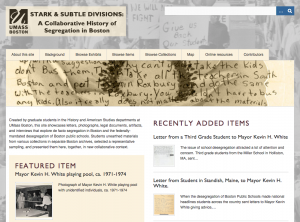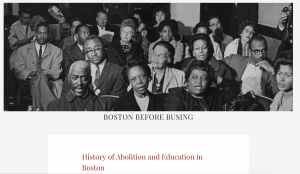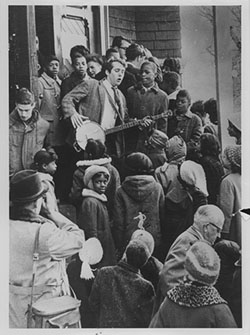BPS Desegregation Project: Busing and Beyond: Creating a Holistic Approach to Undergraduate Teaching and Learning with Archival Collections
The following is a series written by archivists, academics, activists, and educators making available primary source material, providing pedagogical support, and furthering the understanding of Boston Public School’s Desegregation history.
View all posts
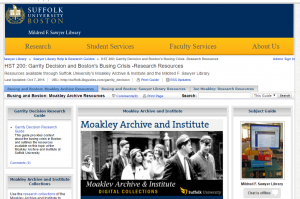 Project Overview
Suffolk University faculty, archivists, and librarians formed a collaborative team in 2015 to develop and disseminate open educational resources (OERS) based on the research collections held by Suffolk University. Archivists and librarians provided reference assistance, bibliographic instruction, research guides, technological support, and digitization services. The curricula were designed to develop students’ information literacy skills and allow them to take advantage of – and navigate the challenges of — a complex and sometimes overwhelming information landscape. In the next phase of the project, the team will develop and test additional OERs, evaluate the effects of student and faculty engagement with OERs, and create guidelines and recommendations for further OER use, expansion, and development at Suffolk and beyond.
Sample OERS (Open Educational Resources)
Using historical documents from Congressman Joe Moakley’s papers related to court-ordered busing in Boston, Professor Reeve created a variety of assignments and classroom exercises for her undergraduate history methods course, “Gateway to the Past: The Historian’s Practice.” Supplemented by lectures, readings, and discussion, Reeve used the assignments sequentially to ensure that students mastered historical thinking skills and then directly applied them to a capstone project. (See the course’s developmental sequence chart below.)
Project Overview
Suffolk University faculty, archivists, and librarians formed a collaborative team in 2015 to develop and disseminate open educational resources (OERS) based on the research collections held by Suffolk University. Archivists and librarians provided reference assistance, bibliographic instruction, research guides, technological support, and digitization services. The curricula were designed to develop students’ information literacy skills and allow them to take advantage of – and navigate the challenges of — a complex and sometimes overwhelming information landscape. In the next phase of the project, the team will develop and test additional OERs, evaluate the effects of student and faculty engagement with OERs, and create guidelines and recommendations for further OER use, expansion, and development at Suffolk and beyond.
Sample OERS (Open Educational Resources)
Using historical documents from Congressman Joe Moakley’s papers related to court-ordered busing in Boston, Professor Reeve created a variety of assignments and classroom exercises for her undergraduate history methods course, “Gateway to the Past: The Historian’s Practice.” Supplemented by lectures, readings, and discussion, Reeve used the assignments sequentially to ensure that students mastered historical thinking skills and then directly applied them to a capstone project. (See the course’s developmental sequence chart below.)

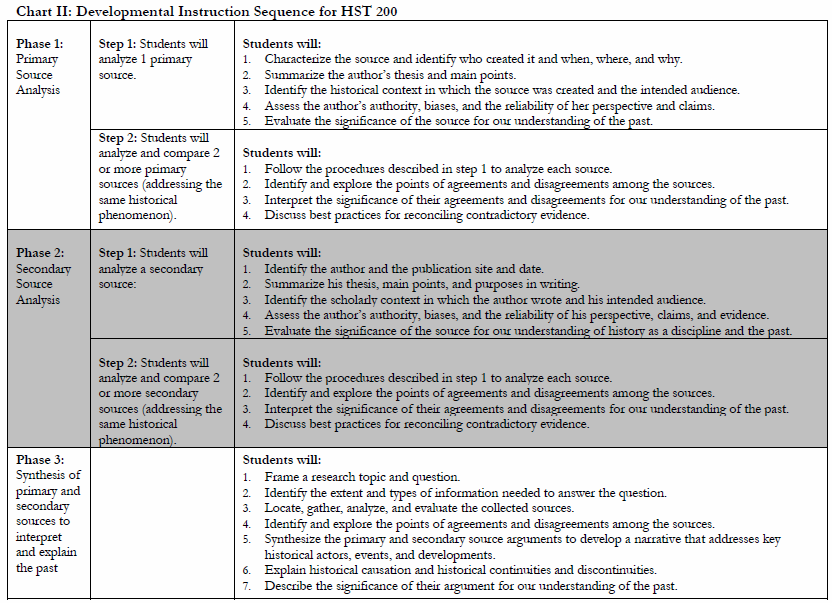 –This post was written by Professor Pat Reeve, History Department and Julia Howington, Director, Moakley Archive and Institute, Suffolk University, http://moakleyarchive.omeka.net/hst200
[1] Historical Thinking Project. http://historicalthinking.ca/historical-thinking-concepts. Accessed December 31, 2014.
[2] Association of College and Research Libraries, “Information Literacy Competency Standards for Higher Education.” (May 26, 2015) http://www.ala.org/ acrl/standards/informationliteracycompetency. Accessed March 1, 2016.
–This post was written by Professor Pat Reeve, History Department and Julia Howington, Director, Moakley Archive and Institute, Suffolk University, http://moakleyarchive.omeka.net/hst200
[1] Historical Thinking Project. http://historicalthinking.ca/historical-thinking-concepts. Accessed December 31, 2014.
[2] Association of College and Research Libraries, “Information Literacy Competency Standards for Higher Education.” (May 26, 2015) http://www.ala.org/ acrl/standards/informationliteracycompetency. Accessed March 1, 2016.
 Project Overview
Suffolk University faculty, archivists, and librarians formed a collaborative team in 2015 to develop and disseminate open educational resources (OERS) based on the research collections held by Suffolk University. Archivists and librarians provided reference assistance, bibliographic instruction, research guides, technological support, and digitization services. The curricula were designed to develop students’ information literacy skills and allow them to take advantage of – and navigate the challenges of — a complex and sometimes overwhelming information landscape. In the next phase of the project, the team will develop and test additional OERs, evaluate the effects of student and faculty engagement with OERs, and create guidelines and recommendations for further OER use, expansion, and development at Suffolk and beyond.
Sample OERS (Open Educational Resources)
Using historical documents from Congressman Joe Moakley’s papers related to court-ordered busing in Boston, Professor Reeve created a variety of assignments and classroom exercises for her undergraduate history methods course, “Gateway to the Past: The Historian’s Practice.” Supplemented by lectures, readings, and discussion, Reeve used the assignments sequentially to ensure that students mastered historical thinking skills and then directly applied them to a capstone project. (See the course’s developmental sequence chart below.)
Project Overview
Suffolk University faculty, archivists, and librarians formed a collaborative team in 2015 to develop and disseminate open educational resources (OERS) based on the research collections held by Suffolk University. Archivists and librarians provided reference assistance, bibliographic instruction, research guides, technological support, and digitization services. The curricula were designed to develop students’ information literacy skills and allow them to take advantage of – and navigate the challenges of — a complex and sometimes overwhelming information landscape. In the next phase of the project, the team will develop and test additional OERs, evaluate the effects of student and faculty engagement with OERs, and create guidelines and recommendations for further OER use, expansion, and development at Suffolk and beyond.
Sample OERS (Open Educational Resources)
Using historical documents from Congressman Joe Moakley’s papers related to court-ordered busing in Boston, Professor Reeve created a variety of assignments and classroom exercises for her undergraduate history methods course, “Gateway to the Past: The Historian’s Practice.” Supplemented by lectures, readings, and discussion, Reeve used the assignments sequentially to ensure that students mastered historical thinking skills and then directly applied them to a capstone project. (See the course’s developmental sequence chart below.)
- What History Matters, and Who Decides? Introduction to Archival Research: students examined course catalogs at the Archives to document and explain changes in the history curriculum over time (.pdf)
- Document Analysis Assignment: students analyzed a historical news clipping (.pdf)
- Mapping Data: Creating and Interpreting Historical Maps: students studied population change over time in Boston and its effects on the school desegregation debates (.pdf)
- Digital Exhibit Project: capstone project in which students developed and narrated a historical argument on the OMEKA exhibit platform, example Boston Massacre Exhibit
- HST 200 LibGuide: compilation of relevant research resources (link)
- Fosters innovations in teaching and learning, many of which are more collaborative & participatory;
- Reduces overall cost of books and materials for students;
- Provides access to education for students who otherwise could not afford or access learning materials.

 –This post was written by Professor Pat Reeve, History Department and Julia Howington, Director, Moakley Archive and Institute, Suffolk University, http://moakleyarchive.omeka.net/hst200
[1] Historical Thinking Project. http://historicalthinking.ca/historical-thinking-concepts. Accessed December 31, 2014.
[2] Association of College and Research Libraries, “Information Literacy Competency Standards for Higher Education.” (May 26, 2015) http://www.ala.org/ acrl/standards/informationliteracycompetency. Accessed March 1, 2016.
–This post was written by Professor Pat Reeve, History Department and Julia Howington, Director, Moakley Archive and Institute, Suffolk University, http://moakleyarchive.omeka.net/hst200
[1] Historical Thinking Project. http://historicalthinking.ca/historical-thinking-concepts. Accessed December 31, 2014.
[2] Association of College and Research Libraries, “Information Literacy Competency Standards for Higher Education.” (May 26, 2015) http://www.ala.org/ acrl/standards/informationliteracycompetency. Accessed March 1, 2016.